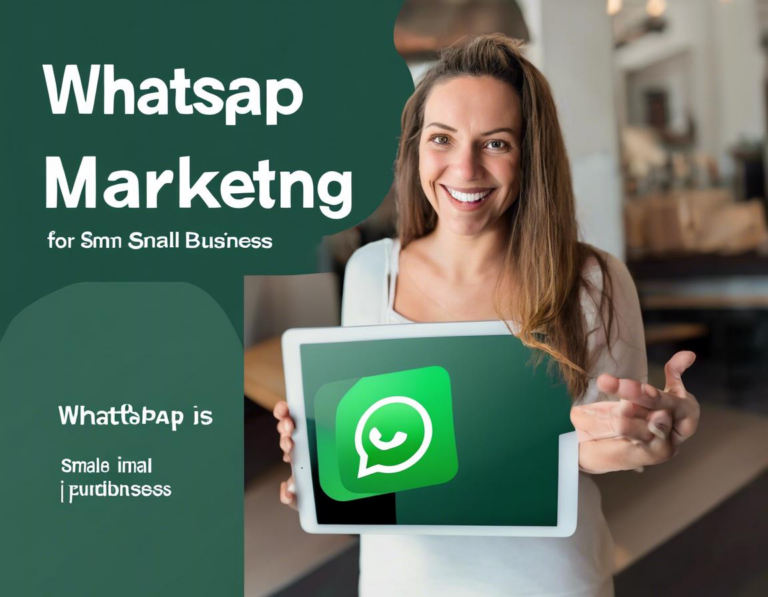WhatsApp Marketing Strategies for Small Businesses

In today’s digital age, it’s more important than ever for small businesses to leverage all available channels to connect with their target audience. And when it comes to instant communication and personal engagement, WhatsApp marketing stands out as a powerful tool. With over 2 billion active users worldwide, WhatsApp offers an incredible opportunity to reach your customers directly, build relationships, and drive sales.
This comprehensive guide will explore effective WhatsApp marketing strategies specifically tailored for small businesses. We’ll delve into various techniques, best practices, and real-world examples to help you make the most of this platform.
1. Understanding the Power of WhatsApp for Small Businesses
WhatsApp isn’t just a messaging app – it’s a dynamic platform with immense potential for businesses. Here’s why it’s a game-changer for small enterprises:
- High Engagement: WhatsApp boasts a high engagement rate, with users actively checking their messages. This translates to a greater chance of your messages being seen and interacted with.
- Personalization: Unlike mass emails or social media posts, WhatsApp allows for one-on-one communication, enabling personalized interactions with customers.
- Cost-Effective: Compared to traditional marketing methods like print advertising or TV commercials, WhatsApp marketing is incredibly budget-friendly.
- Instant Communication: WhatsApp provides real-time communication, allowing for immediate responses to customer inquiries, solving problems, and providing support.
- Multi-Purpose Platform: WhatsApp isn’t limited to text messages. It allows for multimedia content sharing like images, videos, documents, and even voice or video calls, enhancing customer engagement.
2. Setting Up Your WhatsApp Business Account
Before diving into marketing strategies, it’s crucial to set up a dedicated WhatsApp Business account. This separate profile offers features tailored for businesses:
- Business Profile: Create a professional profile with your business information, including your website, address, and business hours.
- Catalog: Showcase your products or services with detailed descriptions and pricing.
- Automated Messages: Set up automated messages for greetings, welcome messages, and quick replies to common customer inquiries.
- WhatsApp Business API: For larger businesses, the API allows for advanced integration with other systems and automation tools.
To create a WhatsApp Business account:
- Download the WhatsApp Business app from the App Store or Google Play.
- Verify your business phone number.
- Fill out the business profile information.
3. Building Your WhatsApp Marketing Strategy
Creating a successful WhatsApp marketing strategy requires careful planning and execution. Consider these key elements:
- Define Your Target Audience: Identify your ideal customers and understand their needs, preferences, and communication styles.
- Set Clear Objectives: What do you want to achieve with your WhatsApp marketing campaign? Increase brand awareness, drive sales, or provide customer support?
- Choose the Right Communication Channels: Decide whether you’ll use broadcast lists, group chats, or individual messages to reach your audience.
- Create Engaging Content: Craft compelling and relevant content that resonates with your target audience.
- Track Your Results: Use analytics to track the effectiveness of your campaigns and adjust your strategies accordingly.
4. Building a Loyal Customer Base with WhatsApp
WhatsApp is an excellent platform for building long-lasting relationships with your customers. Here are some strategies to foster customer loyalty:
- Offer Exclusive Deals and Promotions: Reward your loyal customers with exclusive deals and discounts available only through WhatsApp.
- Personalized Recommendations: Use customer data to provide personalized recommendations for products or services relevant to their interests.
- Provide Excellent Customer Support: Respond promptly to customer queries and concerns, providing quick and helpful solutions.
- Run Contests and Giveaways: Engage your audience with exciting contests and giveaways, encouraging participation and brand interaction.
- Collect Customer Feedback: Use WhatsApp surveys or polls to gather valuable feedback from your customers, improving your products and services.
5. Effective WhatsApp Marketing Tactics for Small Businesses
Now let’s explore some practical WhatsApp marketing tactics that you can implement right away:
5.1. WhatsApp Broadcast Lists
- Target Specific Segments: Create broadcast lists to segment your audience based on demographics, interests, or purchasing behavior.
- Targeted Promotions: Send targeted promotions and product updates to specific groups based on their preferences.
- Announce New Arrivals: Use broadcast lists to announce new product arrivals or special promotions.
5.2. WhatsApp Groups
- Community Building: Create WhatsApp groups to foster a sense of community around your brand.
- Customer Support: Use groups for quick customer support, answering frequently asked questions and addressing concerns.
- Product Feedback: Gather feedback from customers within a group setting, facilitating open dialogue and product improvement.
5.3. WhatsApp Business Catalog
- Product Showcase: Display your products or services with detailed descriptions, pricing, and high-quality images.
- Customer Convenience: Allow customers to easily browse and purchase products directly through the WhatsApp Business catalog.
- Boost Sales: The WhatsApp catalog provides a convenient and visually appealing way to showcase your offerings, driving sales.
5.4. WhatsApp Business API
- Automated Responses: Set up automated responses to common customer inquiries, freeing up your time and providing instant support.
- Order Processing: Integrate the WhatsApp Business API with your e-commerce platform to simplify order processing and customer communication.
- Personalized Interactions: Use the API to send personalized messages and offers based on customer behavior and preferences.
6. Best Practices for WhatsApp Marketing
To maximize the effectiveness of your WhatsApp marketing campaigns, adhere to these best practices:
- Get User Consent: Always obtain explicit consent from your customers before adding them to any WhatsApp groups or broadcast lists.
- Keep Messages Concise: Craft short and engaging messages that convey your message clearly and quickly.
- Use High-Quality Images and Videos: Enhance the visual appeal of your messages with high-quality images and videos to capture attention.
- Use Emojis and Stickers: Add personality to your messages with emojis and stickers to make them more engaging and approachable.
- Monitor Message Frequency: Avoid overwhelming your customers with excessive messaging. Find the right balance to maintain engagement without being intrusive.
7. Measuring the Success of Your WhatsApp Marketing Campaigns
It’s essential to track the success of your WhatsApp marketing efforts to identify what’s working and what needs improvement. Here are some metrics to monitor:
- Open Rate: Measure the percentage of users who open your messages.
- Click-Through Rate: Track the percentage of users who click on links in your messages.
- Conversion Rate: Determine the percentage of users who make a purchase or take a desired action after interacting with your messages.
- Customer Engagement: Analyze customer interactions within WhatsApp groups and individual conversations to gauge their level of engagement.
8. Case Studies: Real-World Examples of Successful WhatsApp Marketing
- Nike: Nike utilizes WhatsApp to send personalized product recommendations, promotional offers, and exclusive content to its customers.
- Starbucks: Starbucks uses WhatsApp to send targeted messages about new menu items, loyalty programs, and promotions.
- KLM Royal Dutch Airlines: KLM uses WhatsApp to provide real-time flight updates, customer support, and personalized travel information.
These examples demonstrate the power of WhatsApp marketing for reaching, engaging, and building relationships with customers.
9. Ethical Considerations in WhatsApp Marketing
As with any form of marketing, it’s important to be ethical and responsible when using WhatsApp. Avoid spamming your customers, respect their privacy, and always obtain consent before adding them to any WhatsApp groups or broadcast lists.
10. Conclusion: The Future of WhatsApp Marketing for Small Businesses
WhatsApp marketing is a powerful tool that can transform the way small businesses connect with their customers. By leveraging its unique features and following the strategies outlined in this guide, you can build a loyal customer base, drive sales, and enhance your brand presence.
As the platform continues to evolve, we can expect even more innovative ways to integrate WhatsApp marketing into your business strategies. Stay informed about new features and trends to maximize your potential and thrive in this dynamic digital landscape.

